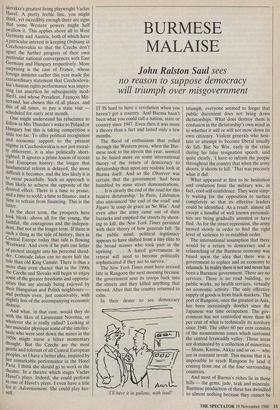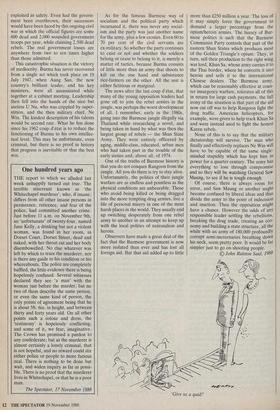BURMESE MALAISE
John Ralston Saul sees
no reason to suppose democracy will triumph over misgovernment
IT IS hard to have a revolution when you haven't got a country. And Burma hasn't been what you could call a nation, state or country since 1947. Even then it was more a theory than a fact and lasted only a few months.
The flood of enthusiasm that rolled through the Western press, when the Bur- mese took to the streets this year, seemed to be based more on some international theory of the return of democracy to dictatorship than upon any realistic look at Burma itself. And so the Observer was certain that the government tad been humbled by mass street demonstrations. . . . It is clearly the end of the road for this bizarre dictatorship.' In Paris, Liberation also announced 'the end of the road' and Figaro 'le coup de grace au Ne Win'. And even after the army came out of their barracks and emptied the streets by shoot- ing to kill, the New York Times persisted with their theory of how generals fall: 'In the public mind, political legitimacy appears to have shifted from a tiny elite to the broad masses who took part in the uprising. . . . A hated government in retreat will need to become politically sophisticated if they are to survive.' The New York Times must have arrived late in Rangoon the next morning because the government sent its troops back into the streets and they killed anything that moved. After that the country returned to calm.
In their desire to see democracy 'I'll have it in gallons, with lead!' triumph, everyone seemed to forget that public discontent does not bring down dictatorships. What does destroy them is confusion in the dictatorship's own mind as to whether it will or will not mow down its own citizenry. Violent generals who hesi- tate or attempt to become liberal usually do fall. But Ne Win, early in the crisis during his false resignation speech, said quite clearly, 'I have to inform the people throughout the country that when the army shoots, it shoots to kill.' That was precisely what it did.
What appeared at first to be hesitation and confusion from the military was, in fact, cool self-confidence. They were simp- ly waiting for the opposition to surface completely so that its effective leaders could be identified. As a result, almost all except a handful of well known personali- ties are being gradually arrested or have fled. As for the street repression, the army moved slowly in order to find the right level of violence to re-establish order.
The international assumption that there would be a return to democracy and a relaunching of the Burmese economy was based upon the idea that there was a government to replace and an economy to relaunch. In reality there is not and never has been a Burmese government. There are no services. There is no road building, no public works, no health services, virtually no economic activity. The only effective supply of goods is from black markets. The port of Rangoon, once the greatest in Asia, has been increasingly derelict since the Japanese war time occupation. The gov- ernment has not controlled more than 40 per cent of what is technically its territory since 1940. The other 60 per cent consists of the mountainous zones which surround the central Irrawaddy valley. Those areas are dominated by a collection of minorities — Shans, Karens, Akkas and so on — who are in constant revolt. This means that it is impossible to reach Rangoon by land if coming from one of the four surrounding countries.
And most of Burma's riches lie in those hills — the gems, jade, teak and minerals. Burmese production of these has dwindled to almost nothing because they cannot be exploited in safety. Even had the govern- ment been overthrown, their successors would have been faced by this ongoing civil war in which the official figures are some 600 dead and 2,000 wounded government troops per year, while claiming 2,500 dead rebels. The real government losses are anywhere from two to ten times higher than those admitted.
This catastrophic situation is the victory of mediocrity. Burma has never recovered from a single act which took place on 19 July 1947, when Aung San, the new country's brilliant leader, and his key ministers, were all assassinated while together at a cabinet meeting. Leadership then fell into the hands of the nice but useless U Nu, who was crippled by super- stition, and the then military chief, Ne Win. The kindest description of his talents would be second rate. What he has done since his 1962 coup d'etat is to reduce the functioning of Burma to his own intellec- tual level. This may be unfortunate, even criminal, but there is no proof in history that progress is inevitable or that the best win.
As for the famous Burmese way of socialism and the political party which incarnated it, there was never any social- ism and the party was just another name for the army, plus a few cronies. Even 60 to 70 per cent of the civil servants are ex-military. So whether the party continues to exist or not and whether the soldiers belong or cease to belong to it, is merely a matter of tactics, because Burma consists of little more than an army that shoots to kill on the one hand and subsistance rice-farmers on the other. All the rest is either fictitious or marginal.
The news after the last coup d'etat, that many of the young opposition leaders had gone off to join the rebel armies in the jungle, was perhaps the worst development of all. I remember, early in the 1980s, going into the Burmese jungle illegally via Thailand while researching a novel, and being taken in hand by what was then the largest group of rebels -- the Shan State Army. They were entirely officered by aging, middle-class, educated, urban men who had taken part in the trouble of the early sixties and, above all, of 1974.
One of the truths of Burmese history is that you do not conquer Rangoon from the jungle. All you do there is try to stay alive. Unfortunately, the politics of their jungle warfare are as endless and pointless as the physical conditions are unbearable. Those who avoid being killed or being dragged into the more tempting drug armies, live a life of personal misery in one of the most harsh places in the world. They usually end up switching desperately from one rebel army to another in an attempt to keep up with the local politics of nationalism and heroin.
Observers have made a great deal of the fact that the Burmese government is now more isolated than ever and has lost all foreign aid. But that aid added up to little more than £250 million a year. The loss of it may simply force the government to demand a larger percentage from the opium/heroin armies. The lunacy of Bur- mese politics is such that the Burmese Communist Party controls that part of the eastern Shan States which produces most of the Golden Triangle's opium. They, in turn, sell their production to the right wing war lord, Khun Sa, whose army carries it to the Thai border, where he converts it into heroin and sells it to the international Chinese dealers. The Burmese army, which can be reasonably effective at coun- ter insurgency warfare, tolerates all of this in return for large cash payments. the full irony of the situation is that part of the aid now cut off was to help Rangoon fight the drug traffic. American helicopters, for example, were given to help track Khun Sa and were instead used to fight the honest Karen rebels.
None of this is to say that the military dictatorship will survive. The man who finally and effectively replaces Ne Win will have to be capable of the same single- minded stupidity which has kept him in power for a quarter century. The army has everything to lose through compromise and so they will be watching General Saw Maung, to see if he is tough enough.
Of course, there is always room for error, and Saw Maung or another might become confused by liberal ideas and thus divide the army to the point of indecision and inaction. Then the opposition might have a chance. However the odds of any responsible leader settling the rebellions, breaking the drug trade, creating an eco- nomy and building a state structure, all the while with an army of 180,000 profoundly corrupt semi-mercenaries breathing down his neck, seem pretty poor. It would be far simpler just to go on shooting people.
C) John Ralston Saul, 1988 `Give us a quid!'























































 Previous page
Previous page